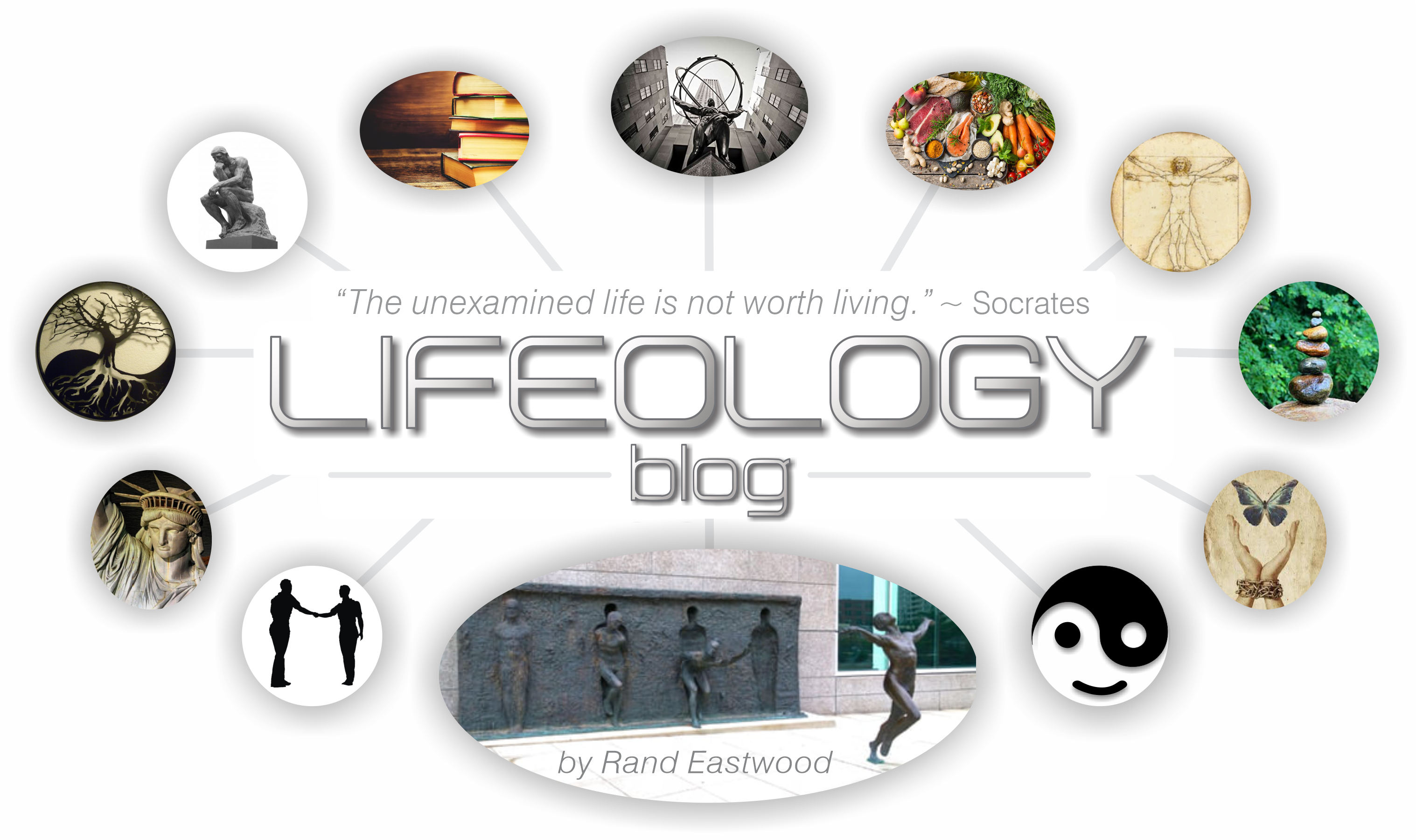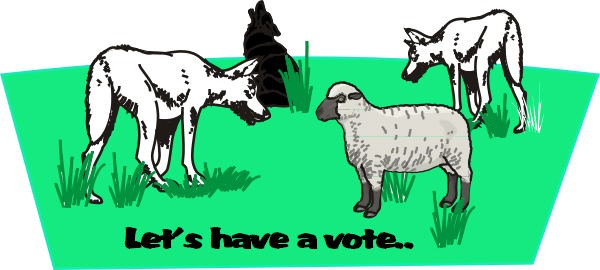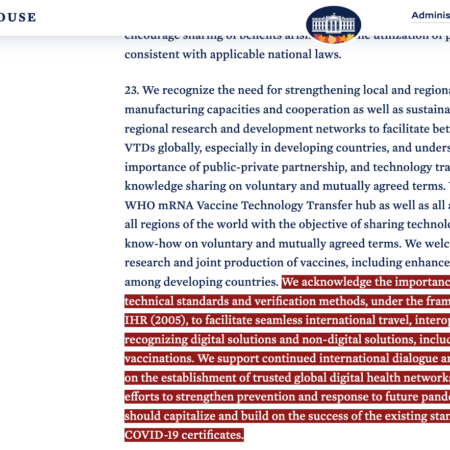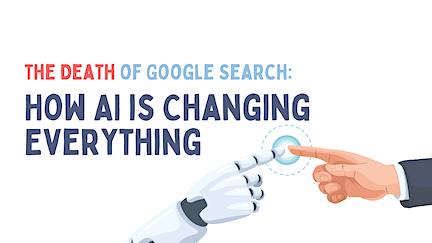When I set out to write this article, I began by describing the futility of my experiences with voting over the years as my philosophy developed, and concluded with the principle that government is evil, being institutionalized violence, the implementation process of which I cannot in good conscience voluntarily participate in, the position I now hold. However, upon completion, and determining that the conclusion is the most important aspect of the article, I decided to reverse the order, and start with that principle, so that readers will grasp that concept first, then follow up with my history of futile voting and my thoughts as my philosophy developed, which readers can go on to review if interested.
The Principle: Government is Institutionalized Violence
Government is institutionalized violence, nothing more, nothing less.
Thus, being once removed, the violence perpetrated against (often innocent) individuals becomes nameless, faceless, and thereby relieves the collective of much of the guilt they would likely feel if they, as individuals, were to inflict that violence against others themselves.
But relieves does not mean absolves…
Collectively, we support the violent institution of government financially (via taxes, fees, campaign contributions, etc), and morally (via voting, supporting/promoting government officials, justifying government functions, etc).
And while it can be argued that we are forced to support the government financially via taxation and fees, under—you guessed it—the threat of violence, it cannot be argued that we are forced to lend financial support via contributions, or moral support of any kind; all such actions are voluntary on our part.
Therefore, taking such voluntary action as individuals makes us complicit in the institutionalized violence of the collective—and thus, is immoral.
(Side Note: the one possible exception might be running for office, not with the intent of exercising the power of that office (“I’ll do the right thing”, or “I’ll do the job better”), but for the sole intent of becoming a wrench in the works…blocking, prohibiting, dismantling, stopping, and generally becoming a thorn in the side of the establishment, doing anything and everything in one’s power to prevent them from exercising their power and perpetrating their violence on the people…for that, and ONLY that, I’ll make a careful exception…)
Father Richard Rohr speaks to the once-removed violence of the state in his book Yes, And…Daily Meditations, in the meditation entitled The Real Devil:
“The devil’s [systemic, or institutionalized, evil] secret is camouflage. [Its] job is to look very moral! It has to look like you are defending some great purpose or cause, like making the world safe for democracy or keeping the bad people off the streets. Then you can do many evils without any guilt, without any shame or self-doubt, but actually with a sense of high-minded virtue.”
He follows up in the meditation entitled The Devil, Part II:
“For most people, whatever system feeds and protects them, or panders to their superiority, is above criticism and, therefore, good. That is all they have and the highest they can think. They do not have their citizenship elsewhere, as Paul writes [Philippians 3:20], and their heart is not yet interested in the Reign of God. For most people, their only citizenship is here, and this is the citizenship they are defending. Not “all of God’s people,” but just “my people, about which God cares most.” Whatever status quo benefits them is the full and final good. Pollsters know this is the way most people will vote. How foolish and how blind this is! Jesus showed no undue loyalty to his religion or to his country, but radically critiqued both of them whenever they demanded to be worshiped. I challenge you to find one patriotic statement from Jesus. (The one that most people wrongly use about “giving to Caesar” [Mark 12:17] is actually a total dismissal of Caesar’s rights in comparison to God’s rights.)”
Also, in the foreword to M. K. Gandhi | An Autobiography or The Story of My Experiments with Truth | Critical Edition, we find the following passage concerning societal violence:
“…the global fraternity of scholars who find in Gandhi a voice that defies the seductive mix of the Enlightenment values and a utopic, urban-industrial world to project an altogether different vision of a desirable society.
In that alternative vision, there is a built-in admission that the Enlightenment might have made some significant contributions to human civilization but the utopic vision, which the Enlightenment projects, has little or nothing to say about the central problem humanity faces today—massive, organized structural and, one might add, ‘scientized’ violence—towards fellow humans…
That quasi-nihilistic violence, which in the twentieth century took a toll of roughly 225 million lives in only genocides, has two crucial components. First, the brutalization that in many societies have taken an epidemic form and, second, the cultivation of political terror without which—one of the protagonists of the French Revolution, Maximilien Robespierre, believed—virtue was helpless.”
Also, in the Editor’s Introduction in Gandhi’s autobiography, after conveying Gandhi’s believe that Truth is God, he states:
“Violence and the quest for Truth [God] cannot exist together.”
Gandhi also references Tolstoy’s profound book The Kingdom of God is Within You: Christianity Not as a Mystical Teaching but as a New Theory of Life, saying “It overwhelmed me. It left an abiding impression on me. . .the independent thinking, profound morality, and the truthfulness of this book…”
In that book, Tolstoy pointed out, some 138 years ago: government is incompatible with the teachings of Jesus (I refrain from using the term Christianity, as I believe that today’s Christianity, as taught by the institutionalized church, bears little resemblance to the actual teachings of Jesus).
In Chapter X, we find this passage:
“Christianity in its true sense puts an end to government. So it was understood at its very commencement; it was for that cause that Christ was crucified. So it has always been understood by people who were not under the necessity of justifying a Christian government. Only from the time that the heads of government assumed an external and nominal Christianity, men began to invent all the impossible, cunningly devised theories by means of which Christianity can be reconciled with government. But no honest and serious-minded man of our day can help seeing the incompatibility of true Christianity—the doctrine of meekness, forgiveness of injuries, and love—with government, with its pomp, acts of violence, executions, and wars. The profession of true Christianity not only excludes the possibility of recognizing government, but even destroys its very foundations.”
He also more briefly addresses this issue in his essay The Law of Love vs. The Law of Violence:
“The true Christian doctrine consists only in the recognition of love as the supreme law of life, and consequently not allowing any exception. This means that the pretended Christian doctrine that does allow exceptions, such as the possibility of the use of violence in the enforcement of laws, is a contradiction as obvious as cold fire or warm ice.”
“It seems natural that if the possibility is once admitted that men may torture or kill their fellow beings in the name of humanity, others may claim the same right to torture and kill in the name of some ideal of the future. The admission of a single case contrary to the law of love destroys all its beneficial characteristics, although it is the basis of all religious or moral doctrines. This seems so self-evident that one hesitates to be obliged to prove it. Nevertheless, the believers or the nonbelievers of the Christian world (the latter acknowledge the moral law) look upon the doctrine of love condemning violence as fantastic and inapplicable to life.”
“It would seem that the workers [the people], not gaining any advantage from the restraint that is exercised on them, should at last realize the lie in which they are living and free themselves in the simplest and easiest way: by abstaining from taking part in the violence that is only possible with their co-operation.”
“When they have at last understood, [it] would be natural to get them to say to those they consider as chiefs, “Leave us alone. If you emperors, generals, judges, bishops, professors and other learned men have need of armies, navies, universities, corps de ballet, ecclesiastic courts, conservatories of music, prisons, gallows, or guillotines, prepare them all yourselves. Tax yourselves, judge yourselves, imprison and execute each other, exterminate yourselves, and get yourselves killed in war. Leave us alone, for we have no need of all these things and we do not wish to participate in acts that are futile as far as we are concerned, and above all, so wicked.”
And again, in Tolstoy’s A Letter To A Hindu:
“The recognition that love represents the highest morality was nowhere denied or contradicted, but this truth was so interwoven everywhere with all kinds of falsehoods which distorted it, that finally nothing of it remained but words. It was taught that this highest morality was only applicable to private life—for home use, as it were—but that in public life all forms of violence—such as imprisonment, executions, and wars—might be used for the protection of the majority against a minority of evildoers, though such means were diametrically opposed to any vestige of love. And though common sense indicated that if some men claim to decide who is to be subjected to violence of all kinds for the benefit of others, these men to whom violence is applied may, in turn, arrive at a similar conclusion with regard to those who have employed violence to them, and though the great religious teachers of Brahmanism, Buddhism, and above all of Christianity, foreseeing such a perversion of the law of love, have constantly drawn attention to the one invariable condition of love (namely, the enduring of injuries, insults, and violence of all kinds without resisting evil by evil) people continued—regardless of all that leads man forward—to try to unite the incompatibles: the virtue of love, and what is opposed to love, namely, the restraining of evil by violence. And such a teaching, despite its inner contradiction, was so firmly established that the very people who recognize love as a virtue accept as lawful at the same time an order of life based on violence and allowing men not merely to torture but even to kill one another.”
More recently, in Why Democracy Rewards Bad People, (or, Why Bad Men Rule), Austrian economist and libertarian/anarcho-capitalist philosopher Hans-Hermann Hoppe wrote:
“The selection of government rulers by means of popular elections makes it nearly impossible that a good or harmless person could ever rise to the top. Prime ministers and presidents are selected for their proven efficiency as morally uninhibited demagogues. Thus, democracy virtually assures that only bad and dangerous men will ever rise to the top of government. Indeed, as a result of free political competition and selection, those who rise will become increasingly bad and dangerous individuals…”
Robert Higgs also summed this up nicely with an analogy which he posted on Facebook:
“Suppose a team of leading economists informed you that you could stimulate your town’s economy by killing all the children in town. Would you support the local government’s killing all the kids? I do not believe you would. And why wouldn’t you, even though you were sure that such killings would enhance the area’s prosperity or even lift it out of depression? Obviously, because this action would be wrong, and no beneficial outcome could justify carrying it out.
Killing children, however, is not the only immoral act people might commit. Theft, extortion, initiation of violence against innocent, peaceful people, and murder are also incontestibly wrong. But because the state rests on such actions—it cannot exist without them—the state is intrinsically immoral as an institution, regardless of any benefits that might flow from state actions or how popular the state might be with its subjects.
One cannot, therefore, support the state’s existence and operation and remain a moral person. All consequentialist rationales for the state fail to exonerate it. It is immoral at its very roots; it cannot be otherwise. You can, of course, simply deny that the state is immoral, but doing so requires that you regard theft, extortion, initiation of violence against innocent, peaceful people, and murder as moral actions, which is indefensible. All statists have, in effect, abandoned morality and become thoroughgoing immoralists. Why they have done so is immaterial.”
And let’s not forget the words of Austrian economist, historian, logician, and sociologist Ludwig von Mises:
“The worship of the state is the worship of force. There is no more dangerous menace to civilization than a government of incompetent, corrupt, or vile men. The worst evils which mankind ever had to endure were inflicted by bad governments. The state can be and has often been in the course of history the main source of mischief and disaster.”
And finally, as a general condemnation, Thomas a Kempis states, in The Imitation of Christ:
“It is supreme wisdom to come daily nearer to the Kingdom of Heaven by despising the world.”
So, for all the aforementioned reasons (not to mention countless others), I believe that government is nothing more than institutionalized violence, and therefore statismStatism: the principle or policy of concentrating extensive economic, political, and related controls in the state at the cost of individual liberty. is inherently evil–and thus the act of voting (or any voluntary participation for that matter) is immoral.
However, with all this being said, admittedly, I have voted a few times in the past (as described below, in The Exercise: Voting is Futile section). But in retrospect, it was always in the interest of increasing liberty, or perhaps simply defensive in nature (lesser of evils), as our rights and liberties as individuals continue to be eroded over time; but to my knowledge, I have never voted with the intent of forcing my will onto others via the violence of the state.
But in due time, I’ve come to realize that regardless of my intent, my voluntary participation in the process necessary to the implementation of institutionalized violence within our society is exactly that—attempting to force my will onto others through the violence of the state—which is indeed immoral, and frankly, again as Tolstoy pointed out so long ago, incompatible with the teachings of Jesus.
In more current times Aaron Ross Powell, as Director and Editor of Libertarianism.org, a project of the Cato Institute, writes of this as well, in his article Voting as a Moral Wrong:
“The democratic process can’t transform immoral acts into moral ones. Therefore, participating in elections entails signing your name to countless misdeeds.”
“When we vote, we aren’t just deciding for ourselves. We’re attempting to decide for others, too. We’re not just expressing a preference (“I prefer traditional taxis to ride sharing services.”), but also expressing a desire to see that preference made, through the application of violence or the threat of violence, the law of the land. We’re saying our opinions are so informed, correct, and important that we’re willing to have men with guns make our fellow Americans obey them, even if our fellow Americans also believe their own opinions are informed, correct, and important.”
“Most [politicians] are rights-violating and immoral. Even by voting defensively, you endorse innumerable wicked aggressions against your fellow men.”
“You may think there are good reasons for [voting], that a world where you vote for violations of basic human dignity and autonomy will be more livable—happier, freer, wealthier, more equal—than one where you don’t. But you’re still party to countless immoralities.”
And I like how Dan Sanchaz, Director of Content at the Foundation for Economic Education conveys this reality in his recent Liberty Letters Substack article, Every Law Should Be Appended With “Or Else We’ll Kill You.”:
“…every law, no matter how unjust and petty, ultimately carries a death sentence as its enforcement mechanism. For the sake of clarity, every law should be appended with “or else we’ll kill you.”
And in his introduction to Robert LeFevre‘s book The Fundamentals of Liberty, editor R. S. Radford says:
“When asked whether he voted, LeFevre would smile and reply that he used neither the ballot or other forms of violence to compel others to act as he thought they should.”
So at a minimum, voting implies acceptance of the premise—that government is necessary, and whoever gets the most votes gets to rule all, even those who didn’t vote for them, and that violence is an acceptable means of conflict resolution, as long as it’s sanctioned by the majority.
But I reject that premise out of hand, because first of all, government isn’t, in fact, necessary—anything that the government “provides” to the people would be better provided by private businesses in a free and open marketplace; and secondly, nobody has the right to rule over anyone else, even if we all vote on it and the majority wins; and finally, violence is never an acceptable means of conflict resolution, and thus should be avoided whenever possible—and certainly shouldn’t be the default.
And then there’s the excuse many use: “It’s not me, it’s the system”, or “It’s the only system we have, so I have no choice” or the like. But James Allen addressed this fallacious thinking in his essay Their Correlations And Combined Results, in the chapter Men And Systems, from the collection Mind is the Master: The Complete Jame Allen Treasury, pointing out the we cannot separate our individual actions from “the system”, they are one and the same:
“There is to-day a widespread revolt against those modes of human activity designated “Systems,” and these systems are almost invariably referred to as something distinct from, and yet directing, controlling, or tyrannizing over, humanity itself. Thus the leaders in the revolt referred to speak of the “commercial system”, the “social system”, the “competitive system,” the “political system,” and so on; and the particular system condemned is made responsible for—made the cause of—certain widespread evils, such as poverty, vice, &c., as though “systems” were some sort of discarnate and gigantic despots, enslaving and crushing an innocent and unwilling humanity.
Such an arbitrary and external form of system has no existence; it is a delusion. Human systems cannot be separated from human desires and needs; they are, indeed, the visible outworking of those desires and needs. A system is none other than the combined and concerted mode of action of the community; it signifies a tacit agreement on the part of all, or nearly all, that things should be so and so; it is a method in which human kind agree to act. And as men act, so systems appear; as they cease to act, so they disappear.
And let it be understood that such agreement to act has no reference to, or bearing upon, a man’s attitude towards a system—whether for or against—but depends upon his actions. A man may violently condemn a system with his lips, yet show that he is in agreement with it in his heart by the fact that he continues to act in accordance with it, to follow it out in his daily life. We are all aware of that form of religious hypocrisy (nearly always unconscious) that continues to commit the sin which it violently denounces; thus showing, in practice, a fundamental agreement with that which, superficially and in theory, is opposed. And this form of unconscious inconsistency is not confined to religion; it is a pronounced factor in all moral activities, and is nowhere more strongly in evidence than in those directions where the reform of “existing systems” is, theoretically at any rate, the primary aim. Thus, when i have asked some socialists, who condemn the present capitalist system as a system of getting rich on the labor of the poor, why they themselves life on dividends—that is, on the fruits of other men’s labor, thus propagating every day that which they denounce as an evil—the reply almost invariably has been, “You should blame the system, not me.” This reply shows that such people regard themselves as the helpless victims of a tyrannical something which exists external to, and independent of, themselves and their actions, and which they call a “system.” But a little reflection will show that which they denounce as the “system” is none other than the viewing as evil certain actions in others which they regard as good in themselves.
Such people being, by their concerted action with others, in agreement with the thing which they denounce, are not merely accessories to the “system” which they regard as evil, they are themselves that system…”
Human systems are human modes of action which are dependent for their continuance on a fundamental tacit agreement among men to continue to act in the same way; and such agreement implies that those who continue to enact any particular system must be prepared to meet and to accept its disadvantages as well as its advantages; for in the struggle for advantage there must always be the corresponding disadvantage; in the battle of human interests there must always be both victory and defeat.
Viewed in this light, the term “innocent victims of the system,” so much in vogue, is seen to be shallow and delusive. There are no innocent victims of a system in which all engage either in the letter or the spirit; if guilt there be, then all are guilty, and the innocence is superficial and apparent, not fundamental and real. In reality, however, there is neither innocence nor guild attached to a human system which has evolved through long processes of struggle and time. There is merely the victory and happiness on the one hand, and the defeat and misery on the other; and the defeated are not the innocent, nor the victorious the guilty, for both these conditions in social life are the just effects of men’s actions, as victory and defeat attach to a battle or a race.”
“If a gambler were continually condemning the “system” of gambling as a bad one, and yet continued to gamble, we should justly say that he was confused both in his morals and perceptions; and he is equally confused who, while condemning any other system, social, political, or whatsoever, yet continues to act it out. Such a man does not, in his heart, regard the system as bad, but as good and just; this is evidenced by the fact that he continues to propagate it by his actions.”
“If a man regards a system as bad, he should withdraw from it in practice, and should bend his actions in another direction…”
And so when it comes to voting, the assertion is that by participating in the system, we all implicitly agree to accept both the premise and the consequences of the process—which means that since I don’t agree with either the premise or the consequences, then I shouldn’t be participating as if I did. And if I do participate, then how do I reconcile my actions to my stated beliefs, while they are in direct opposition to one another? By hypocritically saying that I only agree to abide by the results if my preferred candidate wins?
Unfortunately, it doesn’t work that way.
Summary:
I strive to be a man of integrity—to honor my word, that my words align with my actions, both of which align with my beliefs, that I pursue what is right over what is expedient, etc.—and therefore, as difficult as it may be under our current circumstances, since I have determined that any and all forms of government are essentially (collectively) institutionalized violence perpetrated against (often innocent) individuals, I therefore cannot in good conscious voluntarily—much less enthusiastically—participate in the process, as doing so violates my own morals and principles.
So, as I stated at the beginning of this article, I will participate with government to the extent that I am forced to—when they literally put a gun to my head and give me no choice—such as the extortion of my money (taxes and/or fees), or compliance with their edicts. (Which, by the way, is why I prefer the term ConsensualistConsensualism: The belief that all interactions between individuals should be consensual among all involved, and not forced or coerced (or conversely, constrained or prohibited). over VoluntaristVoluntarism (or voluntaryism) is the principle or system of doing something by, or relying on, voluntary action.: I may voluntarily pay taxes, or comply with government edicts, in order to avoid the ultimately violent consequences—but I certainly do not consent to doing so).
But when given a choice—i.e., when my actions are neither forced nor otherwise required (such as voting, or contributing to candidates, or volunteering for service, etc.,), then I try to adhere to my morals and principles, and avoid those actions when possible.
To conclude this segment of the article, I again leave you with the words of James Allen, as stated in his essay Light on War and Peace, included in the chapter Light on Life’s Difficulties, from the collection Mind is the Master: The Complete Jame Allen Treasury:
“War consists of aggression and resistance, and after the fight has commenced both combatants are like aggressors and resisters. Thus the effort to put an end to war by aggressive means produces war. “I have set myself stubbornly against the war spirit,” said a man a short time ago. He did not know that he was, by that attitude of mind, practicing and fostering the war spirit. To fight against war is to produce war. It is impossible to fight for peace, because all fighting is the annihilation of peace. To think of putting an end to war by denouncing and fighting it is the same as to try to quench fire by throwing straw upon it. He, therefore, who is truly a person of peace, does not resist war, but practices peace. He, therefore, who takes sides and practices attack and defense is responsible for war, for he is always at war in his mind. He cannot know the nature of peace, for he has not arrived at peace in his own heart. The true man of peace is he who has put away from his mind the spirit of quarreling and party strife, who neither attacks others nor defends himself, and whose heart is at peace with all. Such a man has already laid in his heart the foundations of the empire of peace; he is a peacemaker, for he is at peace with the whole world and practices the spirit of peace under all circumstances. Very beautiful is the spirit of peace, and it says, “Come and rest.” Bickerings, quarreling, party divisions—these must be forever abandoned by him who would establish peace.”

UPDATE 11/04/2024: In a more recent article, A Second Look at the Second Amendment, I also touch on my lack of endorsement of any candidate, the immorality of government predicated on force and/or violence, and offer a brief synopsis as to why government doesn’t work. I invite readers to check that article out, too.
I will now follow up with a brief history of my futile experiences with voting, even with as little as I’ve done in past years:
The Exercise: Voting is Futile
As a young man, I was apolitical. I didn’t care one way or another about politics. Although it seems, as I recall, that my parents typically voted Republican, I do not recall politics ever being discussed in our home, around the dinner table, nothing. If anything, they were more religious than political.
So I was apolitical—that is, until I bought a house in the early 90s. I quickly became astonished and infuriated at how the government insinuated itself into the entire process, costing incalculable time and money. We are brought up believing that the US is a free country. One might ask: “Free from what, exactly?”
And it was about that time that a coworker turned me on to the Rush Limbaugh radio program. I began listening daily, and what Rush said seemed to make a lot of sense. Eventually, he won me over: I became what I now term a “Rush Limbaugh Republican”.
So in 1994, I proudly participated in the “Republican Revolution“, which was fueled by Newt Gingrich’s “Contract With America“. And we won! Republicans swept both houses, along with many governorships and state legislatures across the country! I actually had a photo of myself holding up a newspaper, with the headline in massive type across the top: A Grand Old Time For The GOP!
Then, after a job well done, a brushed my hands together, sat back, and watched as…nothing changed.
I was beside myself. I felt totally duped. At the time, the internet was in its infancy, so I began searching for some kind of alternative to the two-party (one party) system, which had proven so ineffective. I stumbled across the Libertarian Party, and their stated platform seemed to have the answers I was looking for. Along the way, I also discovered Harry Browne and Ayn Rand, and started reading their books. Then later, I met Harry Browne during his 2000 campaign as the Libertarian Party presidential candidate.
So I became what I now term a “Harry Browne Libertarian”.
And for the second time in my life, I voted in the 2000 election, casting my vote strictly Libertarian down the ticket.
However, I quickly learned that the Libertarian Party presidential candidate routinely gets vote percentages in the single digits, so casting such votes—out of anything other than principle—is futile, as far as actually affecting change.
So that was the last time I bothered voting for many years. But then, a little over a decade later, I stabilized and resurfaced, right in the middle of the the Ron Paul Revolution.
Interesting: here was a long-term Republican Congressman who was actually libertarian (or even anarchist), running for president on the Republican ticket—and getting tons of support!
I enthusiastically jumped on board. In the process, I registered to vote so I could vote for Ron Paul. I thought if he could be elected—and there was significant signs that he could be—then at least he could potentially put a hold, however temporary, on the decline of our national government from the libertarian principles upon which this nation was founded.
But unfortunately, he was barred from the contest via election fraud (to the best of my recollection), so at voting time I again cast my vote strictly Libertarian down the ticket, the presidential candidate at the time being former New Mexico Governor Gary Johnson.
But in my opinion, the already fringe Libertarian Party eventually began to lose its way (Bill Weld? Seriously?), and once again, I left the political arena out of disgust and futility.
I continued my studies, however…and eventually, my libertarianism reached its ultimate logical conclusion: anarchism (or, my preferred term, autarchy, which I characterize as ethical anarchy).
I simply don’t believe that anyone has the right to rule over anyone else; rather, I believe that all individuals are sovereignIndividualism: The belief that all individuals are sovereign, being the sole and final authority over their own life, mind, body, labor, property, and wealth., being the sole and final authority over their own life, mind, body, labor, property, and wealth. And I believe that all interactions between individuals should be consensualConsensualism: The belief that all interactions between individuals should be consensual among all involved, and not forced or coerced (or conversely, constrained or prohibited)., not forced or coerced (or conversely, prohibited).
In that vein, I take the salient words of the venerable Butler Shaffer to heart:
“Civilizations are created by individuals; they are destroyed by collectives.”
Then, in 2016, I watched (from the sidelines this time) yet another Republican Revolution, this time spearheaded by Trump, after which the GOP held both houses of congress and the white house—and yet again watched (though not so surprisingly this time) as…nothing changed.
Then came the election of 2020, and even as a devout IndividualistIndividualism: The belief that all individuals are sovereign, being the sole and final authority over their own life, mind, body, labor, property, and wealth. and ConsensualistConsensualism: The belief that all interactions between individuals should be consensual among all involved, and not forced or coerced (or conversely, constrained or prohibited)., and even as a self-described AutarchistAutarchy differs from anarchy in that anarchy literally means no rulers, which does not specifically rule out individuals not ruling themselves in the absence of an established ruling institution or government (thus prompting the common conception of violence, lawlessness, riots in the streets). Autarchy, on the other hand, literally means self-rule—which does specify that individuals rule themselves in the absence of an established ruling institution or government. , I still found myself compelled to vote, but this time what I then termed as “defensive” in nature. At the time, I still believed that even though voting was immoral (based on intent), that the “defensive” vote could be justified (also based on intent). And it wasn’t because I was a Trump supporter (I wasn’t), but because the legislature in my home state of Nevada had gone fully Socialist Democrat, and the tyrant governor Steve Sisolak was massively overstepping his authority, and together they were wreaking havoc across the state, destroying the economy, and passing unconstitutional legislation violating our so-called constitutionally-protected rights.
Out of desperation, I voted straight Republican down the ticket, falling for the “lesser of two evils” fallacy…but as we all know, voting for the lesser of two evils is still evil…
And again, I cannot determine that anything changed as a result—much less improved.
So just consider the famous quote:
“If voting changed anything, they’d make it illegal.” ~
The System Is Corrupted
But then, to my chagrin, it became evident that my vote(s) didn’t matter anyway. The supposed “pandemic” was apparently used to facilitate massive election fraud. I have personally seen enough evidence of fraud to warrant an investigation: surveillance video showing the poll workers and Republican observers being sent home late in the evening, and after they left, the remaining supervisors pulled cases of ballots out from under the tables; a video showing a poll worker feeding the same stack of ballots into the machine over and over; a video showing poll workers covering windows and locking doors so observers couldn’t see whatever they were doing inside; the documentary 2000 Mules showing thousands of “mules” trafficking ballots and stuffing ballot boxes in the middle of the night; the list goes on.
And let’s not forget the graphic of the highly unlikely “spike” in Biden votes in Wisconsin, again in the middle of the night, that floated around the internet:

(And simply because the various judges, out of either political loyalty or fear (or perhaps sheer laziness), declined to hear the cases and/or review the evidence, doesn’t mean there isn’t any).
And then, the midterms of 2022 were rife with evidence of fraud as well—though it’s yet to be seen if any of the lawsuits will see the light of day this time around. Probably not. Case in point:
Here in Nevada, gubernatorial candidate Joey Gilbert claims to have undeniable proof of election fraud, which caused him to lose the Republican primary, now calling them “selections” rather than “elections”. But, just like so many cases in the 2020 presidential election, the judge dismissed the case before it went to court. Also, it’s been reported that the surveillance cameras at the Washoe County ROV were turned off, one at a time, and that masses of ballots came in afterward, with the cameras reportedly being dark for over eight hours.
And then there’s Arizona, which now takes a week to “count” their votes, and Katie Hobbs, the acting Secretary of State (the office in charge of the election process), was the Democratic candidate for governor, but didn’t recuse herself—meaning the Democratic candidate for governor was also in charge of the election process—how is this not a conflict of interest? And then the election process, as was reported widely in the news, was rife with problems, including voting machines breaking down and signatures missing or not matching, etc. And after all this, she allegedly beat Kari Lake (UPDATE Kari Lake is now running for US Senate), even though she refused all invitations to a public debate with Lake. As a result of all the suspicious activity, Lake is now preparing a possible legal challenge.
UPDATE #1: It has now been reported that Katie Hobbs’ Secretary of State office threatened Mohave County Board of Supervisors with jail time if they did not vote to certify the election. So, it’s either vote yes to certify, or vote no and go to jail? And this from the office of the very gubernatorial candidate that supposedly won the election, while maintaining her position as Secretary of State, the office that’s in charge of that same election? Can anyone say “corruption”…?
UPDATE #2: It has now been reported that Secretary of State Katie Hobbs has in fact (surprise surprise), shamelessly certified her own election for governor. And, as predicted, opponent Kari Lake has filed suit challenging the certification. But I imagine that her suit, just like all the GOP challenges to what appears to be at a minimum questionable, if not outright fraudulent and criminal election processes, will be summarily dismissed by the courts—again, out of either political loyalty, fear, or perhaps sheer laziness, it’s hard to say.
UPDATE 112024: Republican Kari Lake lost the senate race to Democrat challenger Ruben Gallego, and again many believe that the election was fraudulent.
Then there’s Pennsylvania, where John Fetterman largely hid his sadly debilitated condition due to a stroke earlier in the year, until the debate with Dr. Oz right before election day—but it didn’t matter by then, hundreds of thousands of voters had already cast their mail-in ballots long before that. Would they have voted for Fetterman, if they’d known his true condition beforehand? Well, by then it was too late to know.
Here’s a short video clip of Fox’s Jesse Waters presenting the above evidence of election fraud:
In light of all of this, along with what I’ve personally witnessed during the past two elections, I believe the entire election process is corrupted, has been co-opted, and we now have selections, not elections. So our votes, regardless of party or candidate, no longer matter. They install who they want to install in order to retain their power and continue to fleece the American people.
And nothing ever changes.
But to be clear: it doesn’t matter whether any of it is true—whether the election system(s) in this country have actually become fraudulent, corrupted, co-opted, or not—that’s not my point (remember, I didn’t support either presidential candidate in 2020, and didn’t even vote in 2022, so didn’t have any dogs in those fights). I don’t claim to know either way. Rather, my point is this: I’ve seen so much questionable activity in the process, with zero accountability or resolution, that I no longer trust the election system.
That, along with the lack of effecting any substantial change, is another factor bringing me to the conclusion that voting is futile.
In light of all the aforementioned concerns, consider the famous quote:
“I consider it completely unimportant who in the party will vote, or how; but what is extraordinarily important is this—who will count the votes, and how.”
~ Attributed to Joseph Stalin by Boris Bashanov, in The Memoirs of Stalin’s Former Secretary.
Final Conclusion
So as I’ve continued my studies and contemplations over the years, I’ve determined that government is evil, being essentially institutionalized violence; and that participation via voting—even so called “defensive” voting, or choosing the lesser of two evils—or via any other moral support—makes us complicit in the violence perpetrated against others, and is thus immoral; and besides, the system is obviously corrupted, and even if it isn’t, based on my experience and observations, voting is futile anyway.
And speaking of futility, consider the brilliant words of Clippy:
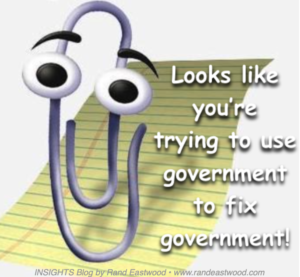
Like/Follow Lifeology Blog on Facebook • View Rand’s Books on Amazon
Visit Lifeology Store • Like/Follow Lifeology Store on Facebook
A Note To Readers:
If you found this article (or any of the others, for that matter) interesting, informative, entertaining, etc., please consider subscribing to the Lifeology email newsletter: simply enter your email into the form below (also in the right sidebar)—or, if you prefer, just use this simple quick sign-up form.
↓↓↓ Also, please hit the “Like” (thumbs up) button below. Thanks! ~ Rand
